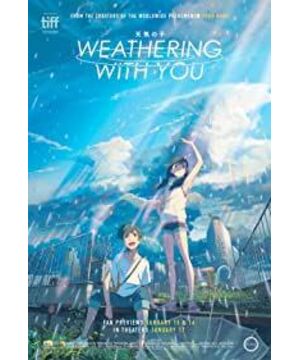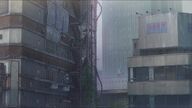In retrospect, Weathering With You was too function-driven. It's not that "the plot has naturally developed to this point", but "the director felt that there should be a dramatic conflict here, so there is this scene", full of mechanical serenity.
For example, the clue to the pistol is deliberate. If you skip the beginning and start watching directly from the male and female protagonists doing business together, you will find that it does not affect the plot at all. So why is a gun needed here?
The line of wading guns was foreshadowed before, just for one purpose: to let the male protagonist "just" pick up the gun at the critical juncture of being pursued, creating a dramatic climax of confrontation with guns. In other words, it doesn't matter how the gun came about. Its function is only to "appear on the rooftop when the male protagonist is pursued", and a series of previous plots have been added to increase the rationality.
The climax (opposition with guns) is decided, how to arrange the plot before the climax? The male protagonist saves the female protagonist, and he cannot simply let him pass by in a car. To enhance the dramatic tension, you must increase the obstacles on the road for the male protagonist, you must run in a Japanese drama, you must be chased, and there must be a thrilling action scene at the critical moment.
How to make the male protagonist be chased by a group of people? (Whether it is the villain or the police, in short, the result of "pursuit" needs to be achieved.) Even if a 16-year-old boy dropped out of school to hang out, there is not much chance of being chased. In order to achieve the goal of "the male protagonist being pursued", he has to do something, but he can't really be the villain. Therefore, the line involving guns was artificially added, and the male protagonist was caught and acted back and forth, so he could not wait for the situation to be explained before going slowly (and did not explain that if he went later, he would not be able to save the female protagonist).
Have you found it? The script of Weathering With You is basically, "I need to set a climax here, and how to achieve the climax, I will add another clue. The plot of this line develops unnaturally, and I don't care how the characters feel. , as long as it can achieve the purpose I need." Yes, when watching a movie, the audience will be attracted by the tense plot, but when I look back and think about it, oh, it's too deliberate.
The same goes for going out on a rainy night. At this moment, a climax of an action scene is needed (traffic blocking, car bombing), and the male and female protagonists also need an opportunity to express their intentions. In Zhang Ailing's words, the fall of a city fulfills the love of two people.
The so-called love in a city must be when the external conditions are bad (such as the heavy snow in the second five miles), and the little love between two people is especially valuable. So there is no difficulty to create difficulties. Brother Cheng asked the police to come to the house with a swipe of his pen. The male protagonist, an unemployed underage, had to take the female protagonist and his younger brother out to get in the rain on a catastrophe and run in the wind and rain. Self-motivated.
People like us who are paralyzed at home on rainy days and waiting for takeout, probably can't be the protagonist of Cheng Ge's style for a lifetime.
"Are you in a relationship? The kind you want to go out and shout in a stormy, rainy day."
"No, no, no."
View more about Weathering with You reviews











